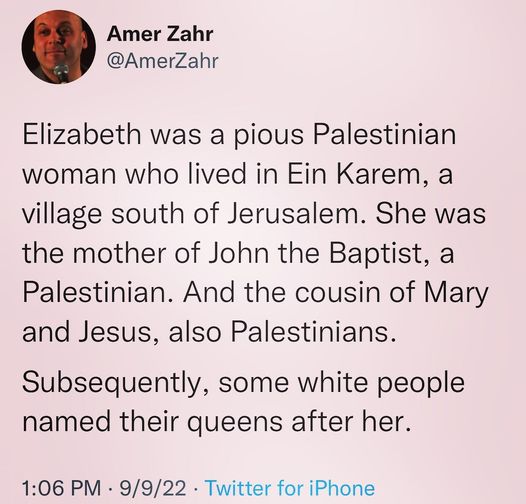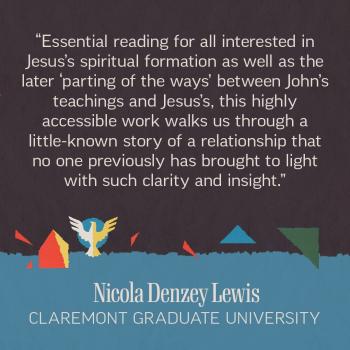A Palestinian-American comedian tweeted and then shared on Facebook this statement: “Elizabeth was a pious Palestinian woman who lived in Ein Karem, a village south of Jerusalem. She was the mother of John the Baptist, a Palestinian. And the cousin of Mary and Jesus, also Palestinians. Subsequently, some white people named their queens after her.”

Before proceeding, let me mention that Palestinian did indeed have an equivalent in that era as a geographic term, Philistine Syria, that part of the region thought of as Syria that had been a center of Philistine civilization. That term in and of itself is not the issue. Here’s what is: I left a comment indicating that using only “Palestinian” was misleading for two reasons. On the one hand they have identities as Israelites within the diversity of peoples in the region, which using only the broad geographic label obliterates. On the other hand, the term Palestinian today denotes the Arab Christians and Muslims who have historically inhabited the region. All terminology is of course potentially misleading. Before they were “Arabs” the Christians in this region spoke Aramaic (sometimes referred to using the term Syriac, which is yet another matter). Arabic became dominant after the arrival of Arab rule. History, language, and identity are messy. The issue is not the claim that Elizabeth and John, Mary and Jesus were Palestinians. They were, geographically speaking. You may have heard the term “Palestinian Judaism” used to denote the Judaism practiced in this part of the world. It is the use of the term Palestinian on its own that is the problem. It sounds like, and from the responses to my comment I gather it was indeed intended as, an attempt to obliterate the Jewish identity of some or all of these individuals. Anti-Israeli sentiment among Palestinians is perfectly understandable. Israel occupied land and continues to do so without integrating its inhabitants as citizens or taking any number of other possible courses of actions that might be deemed just. We presumably all understand why Israel is concerned not to lose its identity as a homeland for the Jewish people. But in my view past atrocities never justify present and future ones. The gas chambers of the Holocaust do not justify the graffiti I saw in Hebron that said “Gas the Arabs.” “Never Again” should mean working to ensure that atrocities never happen again to anyone, not perpetrating atrocities in an ethnocentric effort to prevent them from being done to one’s own people group. Violence begets violence.
Some might say that I should have held my tongue. Some will be unsurprised that I oppose pseudohistory about the Jewish people and their temple with the same insistence that I do pseudohistory about Jesus. My view is that we cannot give in to bullies, which includes not just those who engage in physical violence but also the stereotypical angry racist uncle who will ratchet up the rhetoric and the volume until everyone cowers in fear or simply prefers peace and quiet. My credentials as someone who has taken Jewish students to hear from Palestinians and visit Bethlehem and other places in the West Bank, and has taken Palestinian-American students to Israel as well as Palestine including to the Holocaust museum, hopefully speak for themselves. Trying to rewrite history will not do anything of benefit to the cause of the Palestinians, just as denying the historicity of Jesus doesn’t benefit atheism. When Yasser Arafat spouted laughable claims about the Jewish temple having been in Yemen rather than Jerusalem, it became difficult for anyone to take him seriously. If you spout nonsense about science or medicine I probably won’t be inclined to consider you credible even when talking about something else.
How do you respond to false claims about history?
The connection of this with the death of Queen Elizabeth II makes this topic still more complex. A tweet by Uju Anya drew lots of attention after she wished suffering on the Queen as she died. This was later explained in terms of Anya being the descendent of Nigerians who survived a genocide that was supported by Britain.
Violence begets violence, and violence in most cases undermines the claim to be different from one’s opponents. Atrocities in the present cannot be supported effectively either by wishing reciprocal atrocities or by doing violence to history. There are better ways. It is precisely because I care about genocide, because I care about justice for Palestinians as well as Jews, that I write what I do and dare to wander into the midst of ideological bubbles on Facebook and Twitter.
Amer Zahr unfriended me (at least, I think we were friends, since I saw the Facebook post in question which otherwise I would not have). If he and others like him unfriend everyone who challenges him, he risks ending up like the Germans in Hitler’s time who listened only to antisemitic pseudohistory and expressions of hate. Doing that while appealing to Jesus and other New Testament characters is ironic and sad, given Jesus’ teaching on love for enemies and on using means other than violence to respond to oppression.
Of course, the social media post probably also grabbed my attention since it assumed the historicity of many things that are late traditions, such as the connection of Elizabeth and John with Ein Karem, which I blogged about recently. Hopefully my work in the coming months will bring the historical John the Baptist, as well as those around him, into clearer focus.













